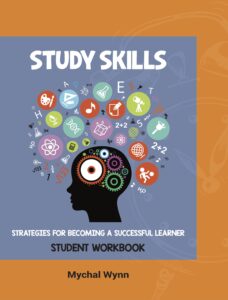Study Skills: Student Workbook
 ISBN: 978-1880463-83-3 | Publication: 2023 | Pages 96 • $19.95
ISBN: 978-1880463-83-3 | Publication: 2023 | Pages 96 • $19.95
The Student Workbook provides easy to understand assessments in Multiple Intelligences; 21 Learning Style Elements; and Learning Styles; and provides guidance in experimenting with multiple learning approaches and study strategies.
The study plan that you develop cannot be prescriptive, which means that your study plan cannot be one that is prescribed for you by your parents, teacher, counselor, coach, mentor, tutor, social worker, or even this book. None of these people, nor this book, understands how your brain best encodes information; retains information; or retrieves (recalls) information. Nor do we know your best learning environment; the most sensitive of your 5 senses; or the time of day in which you are most alert. These are some of the many areas that you will explore through this workbook as you develop the study approach that works best for you.
Developing the right plan will be a process of trial and error. However, when you try something that works, you will then be challenged with making each successful approach a permanent part of your study plan and making a commitment to using the approach. As you might imagine, being organized will be an important component of a successful study skills plan. For example, in the illustration on the adjacent page, the student notes that she needs to create flash cards, use index cards, record lectures, and use different color highlight markers and post-it notes. Consequently, a successful study skills plan will need to ensure that all of the things that she has identified as important components of her study skills plan are easily accessible. This may require checking her backpack or book bag each day before going to school or checking her school locker each day after school to ensure that she has sufficient supplies for the next school day to effectively record lectures or take notes in each class.
 Use this workbook to begin applying what you learn. Write, highlight, and fold back pages as needed. Draw pictures, make connections and circle important topics or concepts. Begin engaging in ongoing self-assessment. Only you can best assess what works, what does not work, and what you need to add, adjust, or remove from your study approaches and routines. Own the Plan!
Use this workbook to begin applying what you learn. Write, highlight, and fold back pages as needed. Draw pictures, make connections and circle important topics or concepts. Begin engaging in ongoing self-assessment. Only you can best assess what works, what does not work, and what you need to add, adjust, or remove from your study approaches and routines. Own the Plan!
Learn how to:
- Develop strategies for learning any subject, despite a teacher’s teaching style or instructional approach
- Develop strategies for strengthening memories and achieving a deeper understanding of what is being taught in school
- Develop strategies and routines for developing an effective at-home study environment
- Develop strategies for better test preparation the SAT, ACT, AP, IB, or EOC exams
- Develop strategies for identifying temperament stressors and how they impact learning
The best study skills plan is “Your Plan”—one that accounts for your brain, your learning style, your time-of-day energy levels, your personality, your mindset, and your goals.
Table of Contents:
- Overview: This is Your Plan
- Bloom’s Taxonomy
- Activity 1: Study Skills Assessment: Part I – How I Best Learn
- 9 Types of Gifts
- Verbal/Linguistic Encoding
- Logical/Mathematical Encoding
- Musical/Rhythmic Encoding
- Bodily/Kinesthetic Encoding
- Visual/Spatial Encoding
- Naturalist Encoding
- Interpersonal Encoding
- Intrapersonal Encoding
- Existential Encoding
- Activity 2: Study Skills Assessment: Part II – How I Best Remember
- Rentention Strategies
- Illustration: How I Best Recall or Demonstrate What I Know
- Activity 3: Study Skills Assessment: Part III – How I Best Recall or Demonstrate What I Know
- How I Best Recall or Demonstrate What I Know
- Activity 4: Auditory, Visual, Kinesthetic, or Tactile?
- Activity 5: My Best Learning Environment
- The 21-Learning Style Elements
- Activity 6: Time-of-Day Energy Level s
- Illustration: The Circadian Cycle
- Activity 7: Right- or Left-Brain Dominant
- Activity 8: In The Moment, My Own Time, In Preparation for an Event
- Activity 9: My Sensory and Learning Preferences
- Activity 10: My Temperament
- Activity 11: My Learning Strategies
- Activity 12: Final Considerations
- Sample Daily Schedule
- Suggested Daily Schedule